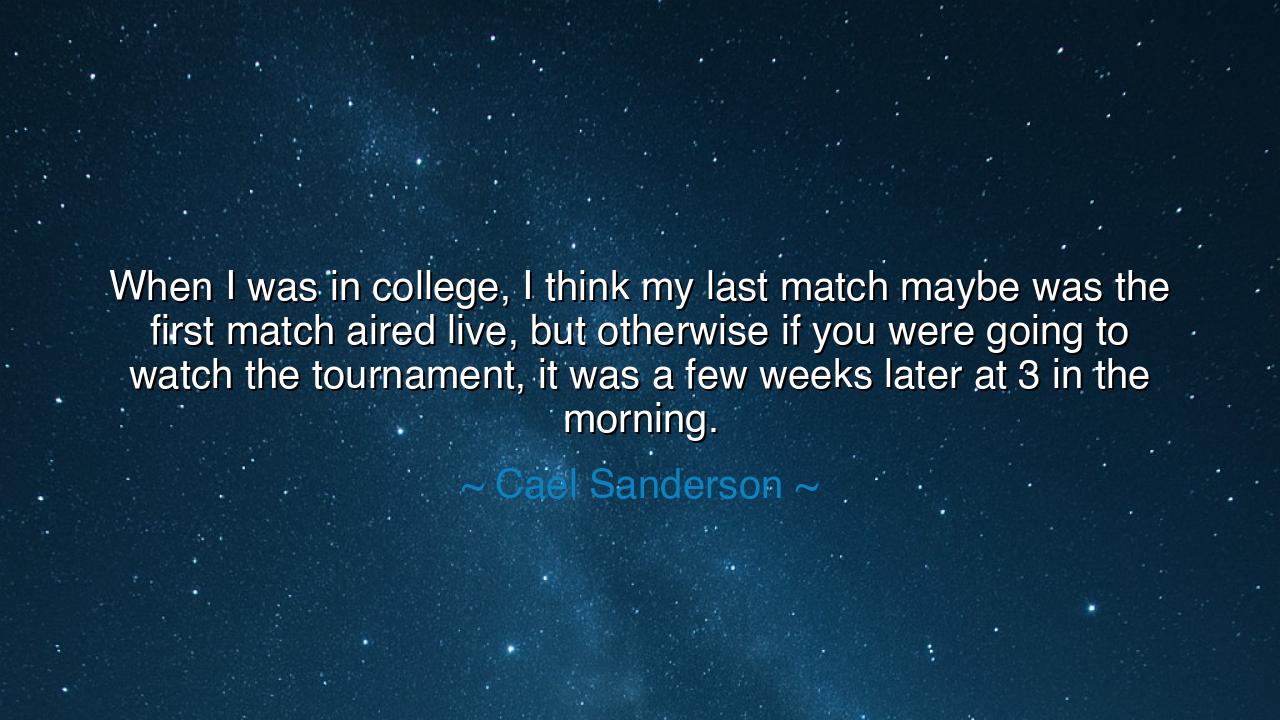
When I was in college, I think my last match maybe was the first
When I was in college, I think my last match maybe was the first match aired live, but otherwise if you were going to watch the tournament, it was a few weeks later at 3 in the morning.






"When I was in college, I think my last match maybe was the first match aired live, but otherwise if you were going to watch the tournament, it was a few weeks later at 3 in the morning." These words by Cael Sanderson reflect a profound shift in how we experience competition and achievement in the modern world. Sanderson’s statement points to a time before the age of instant gratification, where access to live events was a rarity, and the celebration of success was often delayed. The dramatic contrast between the live airing of his final match and the delayed broadcasts of earlier events underscores the rapid advancement of technology and media, where success and exposure are now intertwined with real-time, global connection.
In the ancient world, public spectacle and the ability to witness a victory were monumental. Consider the ancient Olympics, where the grand events were held once every four years, and the winners were not only celebrated but immortalized in stories and statues. The people of Greece would gather in the stadium, witnessing athletic feats firsthand, and the moment of victory was celebrated in the most public way possible. These moments, though experienced by those in attendance, were not immediately available to those beyond the stadium walls. The delay in witnessing triumph was not a matter of days but of years, as the stories of these victories were passed down through oral tradition and carved into marble. Sanderson's recollection evokes this ancient sense of anticipation—the gap between the achievement and the acknowledgment was once much larger, and yet, the significance of victory did not diminish.
The delay in experiencing a victory or achievement is an ancient theme, seen in the Roman Empire as well. Julius Caesar would often send messages of his military victories back to Rome, but the people did not immediately see the triumphs—they waited in anticipation, sometimes for months, to hear the outcome of Caesar’s campaigns. Triumphal parades, though grand and celebrated, were often seen months after the event itself had passed. In this way, the ancient world understood that achievement, while momentous, was often experienced first in solitude or delay, and its significance grew in time. Cael Sanderson's mention of delayed broadcasts echoes this very concept, where the magnitude of his victory did not diminish despite the wait.
In more modern history, we can see this transition from delayed exposure to the immediacy of media in the story of Muhammad Ali. The legendary boxer, while he rose to prominence long before the era of instant live broadcasts, still had moments when his victories were delayed in reaching the masses. But as television grew, his fights were broadcast live, and with the rise of global media, Ali’s impact became instantaneous and global. His greatness was no longer experienced by only a few, but by millions in real-time. Sanderson, in his reflection, likely recognizes the privilege of being part of this new era, where victory can be shared instantly across the world.
However, Sanderson’s experience of the delayed broadcast also serves as a reminder of the nature of time and effort. Success, especially in the athletic world, requires an immense amount of personal sacrifice, often made in isolation, away from the eyes of the public. The delayed exposure of his match emphasizes that the true value of hard work and achievement is not always immediately recognized by others. Athletes, like great philosophers or artists, often toil in relative obscurity, and their greatness is only appreciated later, when it is finally witnessed by the world.
The lesson from Sanderson’s words is that achievement is not always about immediate recognition or fame. It is about the internal satisfaction of pursuing excellence and doing the work, regardless of when or how the world chooses to acknowledge it. In the ancient world, philosophers like Socrates and Plato were not widely recognized in their own lifetimes, yet their ideas and accomplishments shaped the world in the years and centuries that followed. Sanderson's reflection on his delayed match broadcasts serves as a metaphor for all of us: that sometimes, the value of our efforts does not lie in immediate results but in the long-term impact and the internal growth that comes from dedication.
In our own lives, let us take this wisdom to heart. Success does not always come with immediate recognition. The true reward lies in the effort itself, in the discipline, and in the long-term dedication to our goals. Let us remember that like Sanderson’s final match, our greatest moments may not always be immediately visible to the world. But that does not make them any less meaningful. Let us keep working, keep striving, and trust that our efforts will be recognized in due time, just as the ancient heroes’ victories were immortalized long after the crowds had dispersed. Success is not defined by the speed of recognition, but by the depth of commitment we bring to the work we do.






AAdministratorAdministrator
Welcome, honored guests. Please leave a comment, we will respond soon